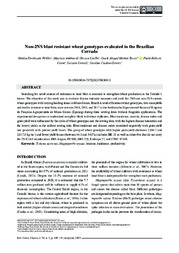Non-2NS blast resistant wheat genotypes evaluated in the Brazilian Cerrado.
Non-2NS blast resistant wheat genotypes evaluated in the Brazilian Cerrado.
Author(s): WEBBER, N. W.; COELHO, M. A. de O; TORRES, G. A. M.; CECON, P. R.; CONSOLI, L.; DEUNER, C. C.
Summary: Abstract: Searching for novel sources of resistance to head blast is essential to strengthen wheat production in the Cerrado´s biome. The objective of this work was to evaluate disease intensity measures and yield for 2NS and non-2NS carriers wheat genotypes with varying heading times in Minas Gerais, Brazil. A total of fourteen wheat genotypes, two susceptible and twelve resistant to head blast, were sown in 2014, 2015, and 2017 at the Sertãozinho Experimental Station of Empresa de Pesquisa Agropecuária de Minas Gerais (Epamig) during three sowing dates without fungicide applications. The experimental design was a randomized complete block with three replicates. Blast incidence, severity, disease index and grain yield were influenced by the cycle of wheat genotypes and the sowing date, with the highest disease intensities and the lowest yields in the earliest sowing date. Blast incidence and disease index correlated negatively with grain yield and positively with percent yield losses. The group of wheat genotypes with higher grain yield (between 2,104.7 and 2,917.8 kg ha-1) and lower yield losses (between 44.3 and 54.8%) includes BR 18 as well as other five that do not carry the 2NS/2AS translocation: BRS Angico, PF 909, BRS 229, Embrapa 27, and CPAC 07340.
Publication year: 2023
Types of publication: Journal article
Unit: Embrapa Wheat
Observation
Some of Embrapa's publications are published as ePub files. To read them, use or download one of the following free software options to your computer or mobile device. Android: Google Play Books; IOS: iBooks; Windows and Linux: Calibre.
Access other publications
Access the Agricultural Research Database (BDPA) to consult Embrapa's full library collection and records.
Visit Embrapa Bookstore to purchase books and other publications sold by Embrapa.

